Nikon D4S Review
Nikon D4S Performance - How well does it take pictures?
Ultimately, it is the image quality that makes a camera worth buying. For a digital SLR, image quality greatly depends on the lens used. While color, noise, contrast and exposure are properties of the camera, distortion, vignetting and chromatic aberrations are properties of the lens. Sharpness depends on the weakest link. So, the camera cannot capture more details than the lens lets through. Conversely, a lens can transmit a greater amount of details than the sensor can capture.

The Nikon D4s produces extremely clean images, besting even the Nikon D4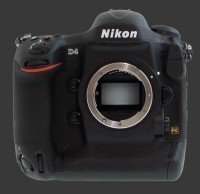
Nikon D4. The D4s, D4 and Df all have the same sensor-size and pixel count which put them close together in terms of theoretical performance. However, technology has been evolving between each of these and the latest one squeezes out some barely noticeable improvement.
ISO 50 to 3200 are impeccable and noise becomes barely visible at ISO 6400 which remains usable for large prints. Even ISO 12800 is usable for all but the largest prints. Fine-details are better-preserved at this level than with the D4.
ISO 25600 starts showing more luminance noise and a little color-noise. This is similar to ISO 12800 on the D4 and where the D4s delivers the most noticeable improvement. Clean mid-sized prints are possible without fuss at this sensitivity.
When this DSLR reaches its expanded ISO range, color-noise jumps visibly. ISO 51200 is rather noisy and is only just ahead of the same sensitivity on its predecessor. One can pull-off mid-size prints here too, although they will not look as smooth as ISO 25600 ones. Dynamic-range drops noticeably at this level, which is normal for an expanded sensitivity.
By the time it reaches 6-digit ISO settings, the D4s no longer performs above the D4. ISO 102,400 is quite noisy with fine details eaten way and contrast greatly reduced. The next ISO is unsurprisingly worse and the headline ISO 409,600 setting is honestly useless. For emergencies, a small 4" x 6" print is possible with a recognizable subject at ISO 204,800 which is very impressive in any case. Blotchiness is visible even on such small print.

Image sharpness is vastly improved on the D4s. The EXPEED 4 processor produce sharp JPEG images with little artifacts when Sharpness is set to the optimal setting of 4. Anything higher shows significant halos along edges. Those who shoot RAW and perform their own conversion will be hard-pressed to match this.
The Matrix metering of the D4s is very good and consistent. Nikon improved this from its predecessor and it is now less likely to clip major highlights. Still, small bright spots get over-exposed a little more than is ideal. The D4s supports a customizable metering offset of ±1 EV in 1/6 EV increments that can be set independently for each metering mode. This is great since Spot and Average metering work exactly as expected and so one can affect Matrix metering only, if desired.
Image parameters provide a good amount of fine-grain flexibility in terms of color rendition. There are six picture styles offering various degrees of realism. Vivid is not as extremely overdone as on previous Nikon models but still visibly over-saturated. The Standard and Natural styles are closest to reality with natural colors somewhere in between. The most realistic results were obtained in Neutral style with Hue at +1.
Automatic white-balance is good under most conditions but struggles under dim artificial light. There are two Auto settings that vary in how they deal with the warm color-cast typical of tungsten lighting. One setting tries to correct it while the other does not. Under low light, they both leave a noticeable yellow cast in images.

Dynamic-range of the D4s is excellent. Exceptionally, it has a nice drop-off as sensitivity increases towards ISO 1600. Between ISO 50 to 800, the newer D610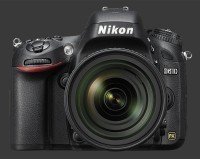
Nikon D610 shows more dynamic-range which makes it a better choice for landscape photography where low ISO and tripods are de rigueur. From ISO 3200 and above though, the Nikon D4s is class-leading.
The Nikon D4s is an incredibly fast camera. Having only 16 megapixels lets it shoot faster than the majority of digital cameras. Reaching 11 FPS, the continuous drive can sustain bursts up to 200 maximum quality JPEG images or 78 losslessly compressed 14-bit RAW files. This lets is shoot for 18 seconds at maximum speed without interruption.
Nikon equipped the D4s with dual memory-card slots which accept the two fastest types of memory available. A traditional Compact Flash Type 1 slot supports UDMA 7 cards which are available in speeds up to 155 MB/s. A unique XQD slot supports cards with faster potential speeds but are presently limited to 125 MB/s and seldom supported by other devices. To use the simultaneous backup feature of this DSLR, you need one card of each type. Otherwise, we recommend sticking to proven Compact Flash.
Every feature and control on the Nikon D4s is responsive and lets the photographer keep working. The D4s is built for speed above all else and is characterized by the following performance numbers:
- Power On: Instant. Excellent.
- Power Off: Instant. Excellent.
- Autofocus: Under ¼s even in low light. Too fast to measure!
- Focus Confirm: Instant for both autofocus and manual focus. Excellent.
- Shutter-lag: Instant followed by extremely short black-out. Extremely good.
- Shot-to-Shot Speed: About ¼s. Class-leading.
- Instant Review: Under ¼s. Excellent.
- Playback Mode: ¼s. Very good.
- Shooting Mode: Instant. Great.
This camera features automatic distortion correction based on pre-programmed lens data. Due to the nature of optical distortion, parts of the captured image get cropped, making precise framing impossible. Enabling it no longer slows down or reduces the buffer-depth of the D4s.
There is an optional Vignetting Control feature. Unfortunately, this one is not profile-based and simply applies the selected level of correction. Options are Off, Low, Normal and High. While vignetting is actually very easily corrected in software without detriment to image quality, we cannot recommend using this feature. Vignetting varies by lens, focal-length and aperture, so it would be way too much work to keep adjusting it according for constantly changing parameters.
The 51-point AF system used on the D4s is ultra-fast and barely slows down in low-light. It is also sensitive down to -2 EV, which is only behind the Pentax K-5 IIs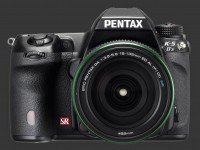
Pentax K-5 IIs and the Canon EOS 6D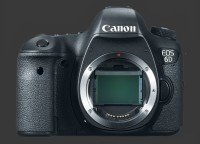
Canon EOS 6D. The Nikon D4s has nothing to fear though, as its AF system is considerably faster than that of the K-5 IIs.

Battery-life is stellar at 3020 shots-per-charge according to the CIPA standard. That is sufficient for an intense day of professional photography. Battery-life goes down faster if the Network interface is ON, so make sure to turn it off when no longer needed. A second battery is always a good idea and Nikon provides an enormous charger that can charge two at once.
Nikon D4S Conclusion

Nikon has perfected the professional DSLR with the D4s. This model takes everything which made the D4 Best Professional DSLR two years in a row and pushes it further: Class-leading image-quality in low-light, super-fast autofocus, fast continuous drive and uncompromising versatility.
Performance of the D4s is nothing but top-notch and class-leading in key areas. Image noise is extremely low, producing usable images at stellar ISO sensitivities. The autofocus system is both incredibly fast and sensitive. While the 11 FPS continuous drive is capable of shooting for over 18 seconds without skipping. Dynamic-range is among the very best too.
This full-frame DSLR is built for professionals with a sturdy weather-sealed body that provides a large number of accessible controls including dual control-dials and an 8-way joystick on each of its two grips. The Nikon D4s has most features ever built into a full-frame DSLR save for a built-in flash. It adds plenty of its own include an FTP client, built-in HTTP server and Time-Lapse Video.
The D4s is hard to fault. Its new 16 megapixels CMOS sensor and EXPEED 4 processor address one of the two major criticisms of the D4, finally delivering sharp output straight out of the camera. The other issue of poor Auto White-Balance in low-light remains while metering is notably improved. Of course, the D4s has such enormous dynamic-range and color-depth that shooting RAW is required to unlock its full potential.
The Nikon D4s is most easily justified for fast action photography, particularly indoor sports. It is also one of the best choices for low-light hand-held photography. Landscape photographers who can use slow shutter-speeds and require the widest dynamic-range at low sensitivities will most likely be swayed by the Nikon D610
Nikon D610 instead, as it costs less than half a D4s.
 |
Please Support Neocamera
All information on Neocamera is provided free of charge yet running this website is a huge endeavor. Purchases made via affiliate links found throughout the site help keep it running and up-to-date. There is no additional cost to you, so please consider buying via these links to our affilates:
If you found any information on this site valuable and did not purchase via our affiliate links, please considering donating via PayPal:
Any amount will be greatly appreaciated. Thank you for your support!
Nikon D4S Highlights
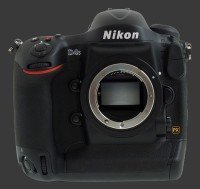
Sensor-Size: 36 x 24mm

Actual size when viewed at 100 DPI
| 16 Megapixels DSLR | ISO 50-409600 |
| Nikon F Mount 1X FLM | Shutter 1/8000-30s |
| 100% Coverage Extra Large Viewfinder | Full manual controls, including Manual Focus |
| 2 Axis Digital Level | Custom white-balance with 2 axis fine-tuning |
| Weatherproof | Spot-Metering |
| Built-in Dust Reduction | Hot-Shoe & Sync-Port |
| 11 FPS Drive, 200 Images | Stereo audio input |
| 1920x1080 @ 60 FPS Video Recording | Lithium-Ion Battery |
| 3.2" LCD 920K Pixels | Compact Flash Type 1, XQD |
Updates
2024.11.18

Best 2024 Photography Gifts for Every Budget
Great gifts for photographers and photo enthusiasts selected for every budget among the best products of 2024.
2024.08.07

Eye Protection Tips for Professional Photographers
The four main considerations for professional photographers regarding eyewear.
2024.07.14

Fujifilm X100VI Review
Flagship fixed-lens compact digital camera with a 40 MP sensor and Image-Stabilization, a first for the series. Retro design featuring dual control-dials, plus direct ISO, Shutter-Speed and EC dials. Its hybrid viewfinder can switch between EVF and OVF mode.
2024.05.09

Fujifilm GFX100 II Review
Flagship 102 Megapixels Medium-Format Mirrorless Digital Camera with 8-Stop 5-Axis IBIS, 8 FPS Drive, 8K Video and 400 MP Super-Resolution capture in a weatherproof and freezeproof body with dual control-dials and dual memory-card slots.
2024.04.03

Fujifilm X-T5 Review
Newest Fujifilm flagship boasting a 40 MP APS-C sensor, 5-axis IBIS with 7-stop efficiency, 15 FPS continuous drive, 6.2K Video capture, dual control-dials and dual SDXC UHS-II slots in a sturdy weatherproof and freezeproof body.
2023.11.20

Best Digital Cameras of 2023
Find out which are the Best Digital Cameras of 2023. All the new Mirrorless Digital Cameras from entry-level to high-end professional.
2023.07.10

Fujifilm X-H2 Review
40 Megapixels APS-C Hybrid Mirrorless Digital Camera with 7-stop IBIS. Fastest shutter ever and 8K video capture. Large builtin EVF with 0.8X magnification and 5.8 MP, plus an Eye-Start Sensor. Packed with features and large number of controls in a weatherproof and freezeproof body.
2023.05.07

Sony FE 20-70mm F/4G Review
Review of the unique Sony FE 20-70mm F/4G lens. The optical zoom of this lens spans ultra-wide-angle and medium focal-length coverage, making it one of the most versatile Full-Frame lenses on the market.
2023.01.15

Huion Inspiroy Dial 2 Review
Review of the Huion Inspiroy Dial 2 tablet, a medium sized drawing surface with dual dials and customizable buttons. Connects via USB-C or Bluetooth 5.0 with Windows, Linux and Android support.
2022.12.08

How to Pack for a Photo Trip
Find out how to pack for a travel photography trip, carry your gear safely while meeting airline regulations.
2022.11.13

Best Digital Cameras of 2022
The best digital cameras of 2022. A short list of the most outstanding models in their respective categories. Choose one for yourself or as a gift.
2022.09.21

Pentax DA* 60-250mm F/4 SDM Review
Review of the Pentax DA* 60-250mm F/4 SDM, the constant-aperture telephoto zoom with the highest zoom-ratio on the market.












